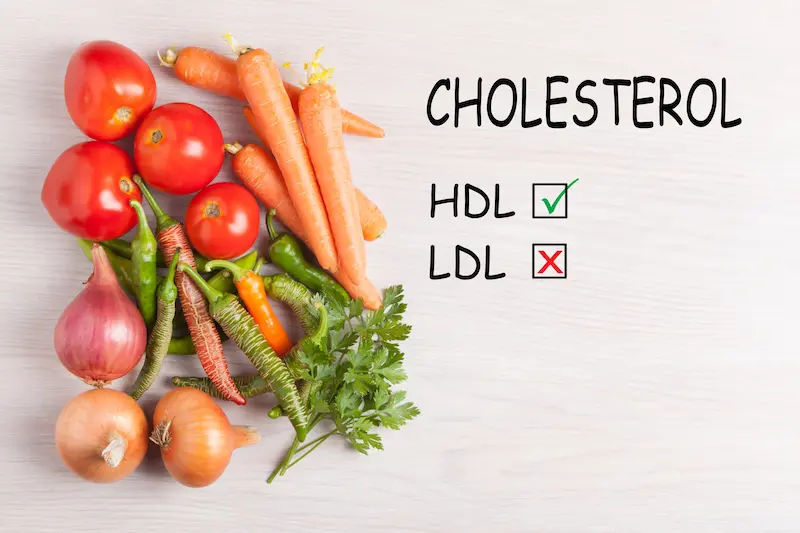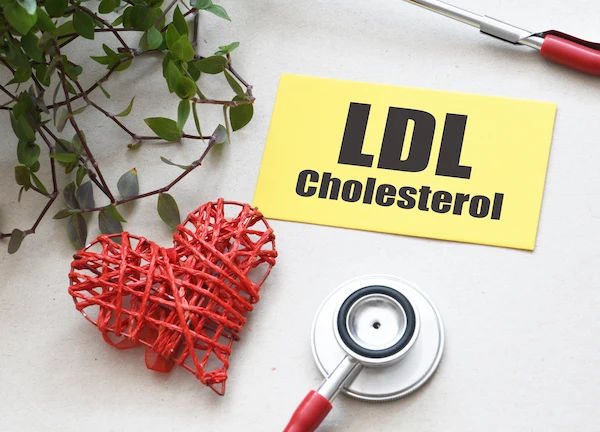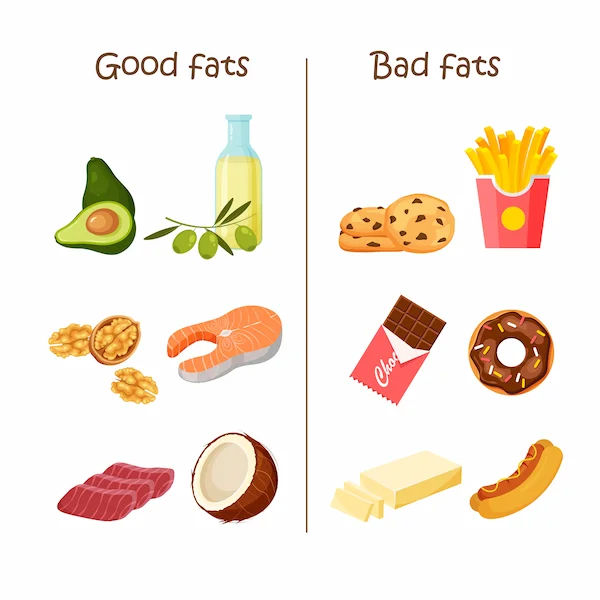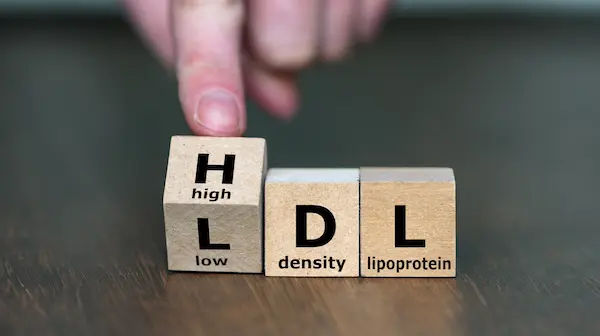How to Reduce Cholesterol in Blood?
Lower your cholesterol naturally with heart-healthy foods, regular exercise, and lifestyle changes. Discover effective ways to manage cholesterol levels and improve heart health.

Written by
Last updated on 13th Jan, 2026
Introduction
Cholesterol is a type of lipid (fat) found in the blood, which plays a crucial role in the functioning of our body. While cholesterol is essential for the production of certain hormones and vitamin D, excessive levels in the blood can lead to serious health concerns, including heart disease and stroke. Our body naturally makes cholesterol, but we also get it from the food we eat. When cholesterol levels get too high, it can build up in the arteries, forming plaques that can narrow and harden them. This condition, called atherosclerosis, raises the risk of heart disease and other heart-related problems.
It's important to manage cholesterol levels to keep our heart healthy and avoid long-term health issues. By lowering cholesterol and making healthier lifestyle choices, we can greatly improve our overall health.
Understanding Cholesterol
Cholesterol is important for many functions in the body, but it needs to be kept in balance. There are two main types of cholesterol that affect our health in different ways.
1. Types of Cholesterol
The two key types of cholesterol are low-density lipoprotein (LDL) and high-density lipoprotein (HDL). LDL cholesterol, often referred to as "bad" cholesterol, is the type that can build up on the walls of arteries and form plaques, leading to atherosclerosis. HDL cholesterol, often called "good" cholesterol, helps remove extra cholesterol from the blood and carries it to the liver to be processed.
It’s important to have a healthy balance between LDL ("bad" cholesterol) and HDL cholesterol. Having high levels of LDL and low levels of HDL can increase the risk of heart disease.
2. Causes of High Cholesterol
There are many factors that can lead to high cholesterol. Some people inherit a tendency for high cholesterol from their parents. Other causes include eating too much unhealthy food, not getting enough exercise, smoking, drinking too much alcohol, and being overweight. Health problems like diabetes, low thyroid function, and kidney disease can also raise cholesterol levels.
Dietary Changes
Changing what you eat is one of the best ways to manage cholesterol. A healthy diet can lower LDL ("bad" cholesterol) and help raise HDL ("good" cholesterol).
1. Foods to Avoid for Lowering Cholesterol
To lower cholesterol, it’s important to avoid foods that increase LDL cholesterol. These include fatty meats, full-fat dairy products, butter, and processed foods. Trans fats, found in things like baked goods, fried foods, and packaged snacks, should also be avoided because they raise LDL and lower HDL cholesterol.
Additionally, cutting back on processed sugars and refined carbs (like white bread and sugary snacks) is key for controlling cholesterol. These foods can cause weight gain, increase inflammation, and lead to higher cholesterol levels.
2. Heart-Healthy Foods to Include in Your Diet
Incorporating heart-healthy foods into your diet can help reduce cholesterol and improve overall cardiovascular health. Foods high in soluble fibre, such as oats, beans, lentils, fruits, and vegetables, can help lower LDL cholesterol by binding to cholesterol in the digestive system and removing it from the body. Healthy fats, such as those found in olive oil, avocados, and nuts, can also support good cholesterol levels and reduce inflammation.
Omega-3 fatty acids, found in fatty fish such as salmon, mackerel, and sardines, have been shown to lower triglycerides and improve heart health. Foods rich in plant sterols, such as fortified margarine and certain types of nuts and seeds, can also help lower LDL cholesterol levels.
Lifestyle Changes
Specific lifestyle changes and dietary modifications can significantly impact cholesterol levels and overall heart health.
1. Importance of Regular Physical Activity
Regular physical activity is one of the most effective ways to lower cholesterol levels. Exercise helps raise HDL cholesterol while lowering LDL cholesterol and triglycerides. Engaging in aerobic exercises such as walking, jogging, cycling, and swimming can improve cardiovascular health and support weight loss, both of which contribute to better cholesterol management.
It is recommended that people aim for at least 150 minutes of moderate-intensity exercise or 75 minutes of vigorous exercise per week. Even small amounts of physical activity, such as taking the stairs or walking briskly for 30 minutes a day, can make a difference.
2. Managing Stress and Its Impact on Cholesterol
Chronic stress can negatively affect cholesterol levels. It activates the body’s fight-or-flight response, releasing stress hormones like cortisol, which can increase cholesterol production. Managing stress through relaxation techniques such as deep breathing, meditation, yoga, and mindfulness can help reduce the harmful effects of stress on cholesterol levels.
Medical Interventions
Sometimes, changing your diet and lifestyle isn't enough to control high cholesterol. In these cases, medicine may be needed to help manage cholesterol levels.
1. Medications for Cholesterol Management
Statins are the most common type of medication used to lower cholesterol. They work by blocking a substance in the liver that makes cholesterol. Other medications, like bile acid binders, cholesterol absorption blockers, and PCSK9 inhibitors, might also be used depending on a person’s cholesterol levels and overall health.
It's important to take the prescribed medication as directed and keep regular appointments with your doctor to check your cholesterol and make sure the treatment is working properly.
2. Role of Supplements in Cholesterol Reduction
Some people may also benefit from taking supplements to help manage their cholesterol levels. Supplements such as omega-3 fatty acids, plant sterols, and soluble fibre (e.g., psyllium) have been shown to support healthy cholesterol levels. However, it is essential to consult a healthcare provider before taking supplements, as they may interact with other medications or conditions.
Natural Remedies
In addition to dietary and lifestyle changes, specific natural remedies have been shown to support healthy cholesterol levels.
1. Herbs and Spices Beneficial for Cholesterol
Several herbs and spices may have cholesterol-lowering properties. For example, garlic has been found to have a modest effect on reducing total and LDL cholesterol levels. Turmeric, containing the active compound curcumin, has also been shown to have anti-inflammatory effects and may help reduce cholesterol. Other herbs, such as ginger, cinnamon, and fenugreek, may also help lower cholesterol and improve overall heart health.
2. Home Remedies That May Help
Some home remedies, such as consuming a mixture of apple cider vinegar and honey or drinking green tea, may positively affect cholesterol levels. While these remedies may benefit, they should not replace medical treatment or lifestyle changes for cholesterol management.
Monitoring and Testing
It's important to check your cholesterol levels regularly to see how well you're doing and to make any needed changes to your treatment.
1. Regular Cholesterol Level Monitoring
Routine tests, like a lipid profile, measure your total cholesterol, LDL ("bad" cholesterol), HDL ("good" cholesterol), and triglycerides. These tests should be done regularly, especially if you have risk factors like a family history of heart disease, high blood pressure, or diabetes.
2. Understanding Cholesterol Test Results
Understanding the results of a cholesterol test is crucial for managing cholesterol levels effectively. Healthy total cholesterol should be below 200 mg/dL, LDL cholesterol should be less than 100 mg/dL, and HDL cholesterol should ideally be above 60 mg/dL. Triglyceride levels should be under 150 mg/dL.
Risks of Untreated High Cholesterol
Failing to manage high cholesterol levels can lead to a range of serious health complications.
1. Impact on Cardiovascular Health
The most significant risk of untreated high cholesterol is cardiovascular disease. High LDL cholesterol levels can lead to the buildup of plaques in the arteries, narrowing them and reducing blood flow. This can lead to conditions such as coronary artery disease, heart attacks, and strokes.
2. Other Potential Health Complications
In addition to heart disease, high cholesterol can contribute to other health issues, including kidney disease, high blood pressure, and diabetes. It is important to manage cholesterol levels to reduce the risk of these complications.
Preventive Measures
Preventing high cholesterol is just as important as managing it.
1. Tips for Kids and Young Adults
Teaching children and young adults about the importance of a healthy diet, regular exercise, and stress management can set the foundation for lifelong cholesterol management. Encouraging healthy habits early can reduce the risk of developing high cholesterol and related health issues later in life.
2. Cholesterol Management in Older Adults
As people age, cholesterol levels may naturally rise. Older adults should maintain a balanced diet, stay active, and monitor their cholesterol levels regularly to ensure optimal heart health.
Conclusion
Managing your cholesterol is important for staying healthy and preventing serious problems like heart disease and stroke. By eating a heart-healthy diet, staying active, managing stress, and getting the right medical treatment when needed, you can lower your cholesterol and feel better overall. Regularly checking your cholesterol levels and understanding them helps you make better choices for your heart health and lowers the risks of high cholesterol.
Consult Top Cardiologists
Consult Top Cardiologists

Dr. Tripti Deb
Cardiologist
40 Years • MBBS, MD, DM, FACC, FESC
Hyderabad
Apollo Hospitals Jubilee Hills, Hyderabad

Dr. Anand Ravi
General Physician
2 Years • MBBS
Bengaluru
PRESTIGE SHANTHINIKETAN - SOCIETY CLINIC, Bengaluru
Dr Moytree Baruah
Cardiologist
10 Years • MBBS, PGDCC
Guwahati
Apollo Clinic Guwahati, Assam, Guwahati

Dr. Zulkarnain
General Physician
2 Years • MBBS, PGDM, FFM
Bengaluru
PRESTIGE SHANTHINIKETAN - SOCIETY CLINIC, Bengaluru

Dr. E Prabhakar Sastry
General Physician/ Internal Medicine Specialist
40 Years • MD(Internal Medicine)
Manikonda Jagir
Apollo Clinic, Manikonda, Manikonda Jagir
(175+ Patients)
.webp)



